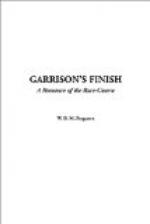“Nothing more than I’ve said. He was a first-class boy in his time. A boy I’d like to have seen astride of Dixie. Such stars come up quickly and disappear as suddenly. The life’s against them, unless they possess a hard head. But Mr. Waterbury, when he arrives, can, I dare say, give you all the information you wish. By the way,” he added, a twinkle in his eye, “what do you think of the colonel’s other thoroughbred? I mean Miss Desha?”
Garrison felt the hot blood mounting to his face. “I—I—that is, I—I like her. Very much indeed.” He laughed awkwardly, his eyes on the parquet floor.
“I knew you would, boy. There’s good blood in that girl—the best in the States. Perhaps a little odd, eh? But, remember, straight speech means a straight mind. You see, the families have always been all in all to each other; the colonel is a school-chum of mine—we’re never out of school in this world—and my wife was a nursery-chum of Sue’s mother—she was killed on the hunting-field ten years ago. Your aunt and I have always regarded the girl as our own. God somehow neglected to give us a chick—probably we would have neglected Him for it. We love children. So we’ve cottoned all the more to Sue.”
“I understand that Sue and I are intended for each other,” observed Garrison, a half-cynical smile at his lips.
“God bless my soul! How did you guess?”
“Why, she said so.”
Major Calvert chuckled. “God bless my soul again! That’s Sue all over. She’d ask the devil himself for a glass of water if she was in the hot place, and insist upon having ice in it. ’Pon my soul she would. And what does she think of you? Likes you, eh?”
“No, she doesn’t,” replied Garrison quietly.
“Tell you as much, eh?”
“Yes.”
Again Major Calvert chuckled. “Well, she told me different. Oh, yes, she did, you rascal. And I know Sue better than you do. Family wishes wouldn’t weigh with her a particle if she didn’t like the man. No, they wouldn’t. She isn’t the kind to give her hand where her heart isn’t. She likes you. It remains with you to make her love you.”
“And that’s impossible,” added Garrison grimly to himself. “If she only knew! Love? Lord!”
“Wait a minute,” said the major, as Garrison prepared to leave. “Here’s a letter that came for you to-day. It got mixed up in my mail by accident.” He opened the desk-drawer and handed a square envelope to Garrison, who took it mechanically. “No doubt you’ve a good many friends up North,” added the major kindly. “Have ’em down here for as long as they can stay. Calvert House is open night and day. I do not want you to think that because you are here you have to give up old friends. I’m generous enough to share you with them, but—no elopements, mind.”
“I think it’s merely a business letter,” replied Garrison indifferently, hiding his burning curiosity. He did not know who his correspondent could possibly be. Something impelled him to wait until he was alone in his room before opening it. It was from the eminent lawyer, Theobald D. Snark.




